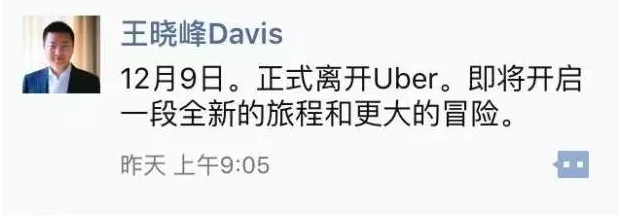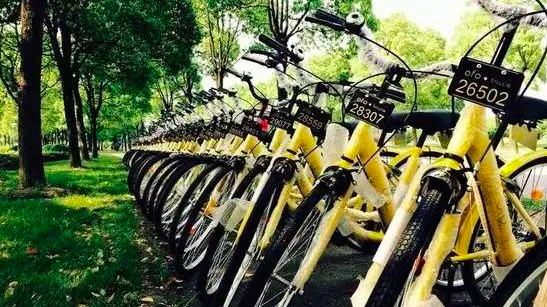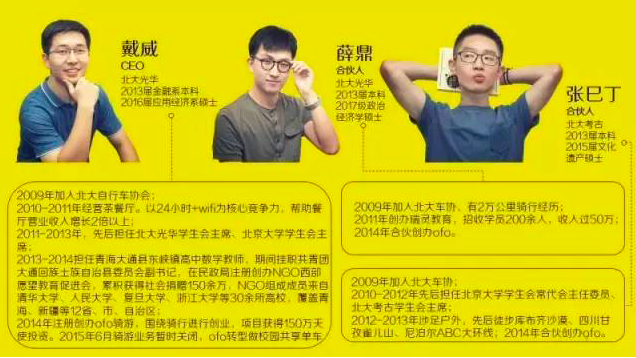
Wang Xiaofeng was born with background in sales. After graduating from Xiamen University Management Department more than 10 years ago, he went through P&G, Google, Coty Group and Tencent, and was eventually known as the general manager of Uber Shanghai. At that time, Uber Shanghai had always been a severely affected area of ​​PR. Problems concerning personnel, recruitment, driver reception, internships, and so on continued to emerge. People's comments on Wang Xiaofeng were also mixed.
Uber entered China in February 2014. The first city at that time was Shanghai. Wang Xiaofeng, who was one of the early leaders, has been the city manager of Shanghai and has been a potential competitor of Uber China's CEO. Unexpectedly, under the leadership of Wang Ying, the city manager of Hangzhou, the Hangzhou regional business delivered the best answer in the country and even in the world. (At the time, Uber's global top ten cities were Guangzhou, Chengdu, Hangzhou, Shenzhen, and Beijing. , but there is no Shanghai).
So when Uber China made organizational adjustments in September of the same year, Wang Ying of the MBA background of Columbia University took over as the head of Huazhong District, and managed the cities of Shanghai, Hangzhou, and Suzhou. Since then, Uber’s internal circulation of Wang Xiaofeng’s departure has begun. news.

Until the end of 2015, Wang Xiaofeng released the state of the above figure in a circle of friends and formally announced his departure. Until Uber China was acquired by DDT, there was no CEO role within the team. Liu Yan has been leading Uber China as a strategic leader.
Xiaofeng Wang did not wait for the CEO in Uber China and realized it in the mobike. Mobike also started from Shanghai, Wang Xiaofeng has the opportunity to fight in his home base.

The core problem mobike is trying to solve is the last-mile travel problem.
The concept of sharing bicycles is not new. Many subways had many government-led shared bicycle projects many years ago. However, due to the difficulty of planning and the restriction of fixed parking piles, they were basically abandoned. The similar project Citibike in New York, USA operated. For a long time, it was difficult to maintain because of business difficulties.
The biggest difference between mobike and previous government projects is that there is no fixed parking lot or site. The user can view the vehicles in real time through the APP, and can quickly unlock the code through the QR code, and park it in any public parking area after use. .
Moreover, in order to solve unsolved problems of the previous generation, mobike has done many articles in bicycle redesign and hardware, such as adopting aluminum alloy as body waterproof and rust-proof, using solid tires to explode tires, avoiding inflation, and referring to the automobile's hub technology. Shock to avoid damage and so on. However, this also leads to a doubling of body weight to 25 kilograms. It is inevitable that someone will sigh with emotions that are "heavily weighted and not rideable" in the circle of friends.
For the business model, the current mobike fee is 1 yuan for half an hour, which can be paid via WeChat or Alipay. We may wish to help mobike simple calculations, mobike R & D head Jerry Yang said that mobike's goal is to avoid maintenance for four years, then the basic can be understood as depreciation depreciation time is four years. If a car is used for one hour in a day, then it will be able to bring in 2 yuan in one day. Suppose there are 300 days of effective use of the days in a year, that is 600 yuan of income, and 4 years is 2400 yuan, that is, Say, if a car's fixed delivery cost is less than 2,400 yuan (the actual investment is definitely much less than 2400, and the actual duration of use is believed to be higher than 1 hour), without considering other expenditures, this is a good business for making money. Now.
In addition, there is one thing that many people did not think of. It is a deposit. Mobike requires each user to pay a deposit of 299 yuan, and most users who normally use the mobike service will not take out the deposit, which will give mobike excellent cash flow and capital deposits.
Sources said that the latest round of mobike valuation has reached hundreds of millions of dollars.

If you call mobike a small red car, there is another company in Beijing that calls itself a small yellow car. This company, which started from Peking University and made its way to the campus market, is called ofo.
Yesterday, 36kr released an article called "ofo won Jingwei China tens of millions of dollars in B round investment, why do we think this may be a phenomenon-level company?" The full text is well-founded. One look is that investors have output in the interview. Many viewpoints, but the whole article did not mention the mobike that is obviously hotter on the market. Chapter 42 considers that even the latitude and longitude are investors of 36kr and ofo at the same time, as media reports:
This is not good.

(The above picture is from an internal lecture of Peking University's unnamed name)
The founder of OFo was a classmate of Peking University Car Association. Under the leadership of Dai Wei, their pioneering operation was the direction of the bicycle riding group. Needless to say, this direction naturally collapsed. Afterwards, in June of 15 years, they switched to sharing bicycles on campus. Currently, OFO has expanded to 20 cities, registered users exceeding 800,000, and daily orders up to 200,000. It can be said that they did find their own PMF (product market fit point).
The 36kr article was divided into four points to analyze why ofo may be the next phenomenon-level company.
1) The cut-in angle is good: the bicycle in the campus is just needed, the use efficiency is high, and there is a significant tidal effect.
However, if someone cuts through the social scene in a harder way and eventually walks through it, then the cut-in angle may end up being constricted. If you were just hungry and you were born, you would have competitors like the U.S. team and Baidu, so I think that even if you cut from the campus, he cannot survive. The mobike team is significantly more rich than the experience of ofo.
2) Financial model: ofo's bike cost is 270 yuan, and the daily volume of each vehicle is 10, and the customer price is 0.5 yuan, so you can return this card within 2 months.
However, first of all, I doubted the authenticity of the open operational data. Second, I am more worried about the cost of repairs and scrapped depreciation brought about by the combination of cheap vehicles and cheap mechanical locks. But of course, of course, ifof real data, then ofo is a pretty good business.
3) Future market: The author used hungry and staged music as examples to show that there is a precedent for success from the campus market to the success of the campus.
However, first of all, I think that there is a timing opportunity for hunger. It may not be reproducible. Secondly, whether staged music dares to say that he has successfully exited the campus market is a very skeptical. More examples we have seen are startup companies that have difficulty getting out of the closed campus market, such as everyone.
4) Equity background: Because there are Jingwei, Jinshajiang, Wang Gang and other drop-dip investors, the future development can be expected.
However, the latitude and longitude have once again placed a heavy emphasis on the e-generation drive, but in the end, Didi also did not leave mercy. Investors have aura, but they are not necessarily invincible.

The picture above is a photo of mobike CEO Wang Xiaofeng posted on Weibo on August 22, taken in front of Peking University.
From August 18 to August 22, Wang Xiaofeng published three messages on mobike to Beijing University in just a few days. One of them was even “please ask Vice President Wang Yanglin of Peking University to test riding on M bicycle". It seems that when OFO has not yet come out of the campus, MOBIKE has determined to proactively provoke war and enter the headquarters of OFO.
It sounds like, ofo and mobike seem to be interpreting a new era of dripping and fast stories, everything is good in the imagination. According to industry investors, the two companies now do not need BP (business plan) for financing, and investors are rushing to visit. But there is a difference between the competition and the competition at the time. It is that there is already a drop in the world, and the goal of the drop is to make a platform, so in my opinion, the drop will not miss this opportunity. .
At the beginning, when companies such as the Tuk Bus and Piggy Bus had just come out, I had talked with the founders of more than a dozen similar models. When the shared bus market was still very early, the business model was still far from Verified. However, the reaction rate of DDT exceeded everyone's expectation. It quickly entered the market through the merger of Koala buses and launched the DDT bus service. This directly stopped the ambitions of the capital-related companies and eventually left the rest. Entrepreneurs in the shared bus sector are struggling.
As a company that shares bicycle types, the core barrier we can imagine is:
1) Development of hardware and software involving vehicles
2) Bicycle layout and scale effect brought by capital investment
3) Network effect and entrance effect brought by marketing
For Didi, both the first and the second are directly realized through capital, and the third is the greatest advantage that Didi currently uses as the entry and exit of the trip.
Both ofo and mobike have already developed to round B. I believe that in terms of the speed of reaction, they will launch their own similar businesses in the near future. After all, these giants are most afraid of companies that emerge from inexplicable places. The most afraid of being drastic. What happens to the situation of ofo and mobike is really hard to predict.
Ant gold suits to move mobile payment and O2O, madness to even KFC not let off, then the same type of shared bicycles with mobile payment and O2O properties are naturally strategic, let alone the frequency of this crowd may be more than High, but the degree of coincidence is not necessarily high.
So, in fact, I think the company that should most definitely stand behind toofo or mobike is Baidu or Jingdong. Both companies are deeply deploying O2O business, and they also suffer losses in the financial sector due to the lack of payment links. Conversely, for ofo or mobike, if you do not have a good way to defend against this potential entrant, it may be a better choice to think ahead of time which giant you want to stand on. What's more, Dada's people may send takeaways in the future, but they can also use shared electric cars. Baidu can also use the unmanned bicycle that it claims to have developed for a long time. (Ok, this is a joke.)
The ofo who came from Peking University has been compared by many people and hungry. Zhang Xuhao also started from the Shanghai Jiaotong University and made billions of people. However, in the end it was difficult to escape the fate of Ali without a clear profit forecast. Uber China, which cultivates Wang Xiaofeng, is hard to escape from his fate. As Bao Fan once said, BAT is like the gods in the sky and is watching people fighting in the mortal world.
Finally, 36kr stated at the end of the article that "For this company that we think may be the next "phenomenon level", 36 will continue to pay close attention."
In this regard, Chapter 42 stated that “we think that 36kr has some truth in saying, but it is also likely to become a “catch it†company due to the entry of Didi, or a strategic layout company attached to Baidu and other giants, Chapter 42 Will continue to pay close attention."
Wish them good luck and wish you a pleasant weekend.
Lei Feng Network (search "Lei Feng Net" public concern) Note: The author of this article Qu Kai, originally contained in the 42 chapters (ID: MyFortyTwo). This article is authorized by the author to release Lei Feng network, reproduced, please contact the authorize and retain the source and author, may not delete the content.